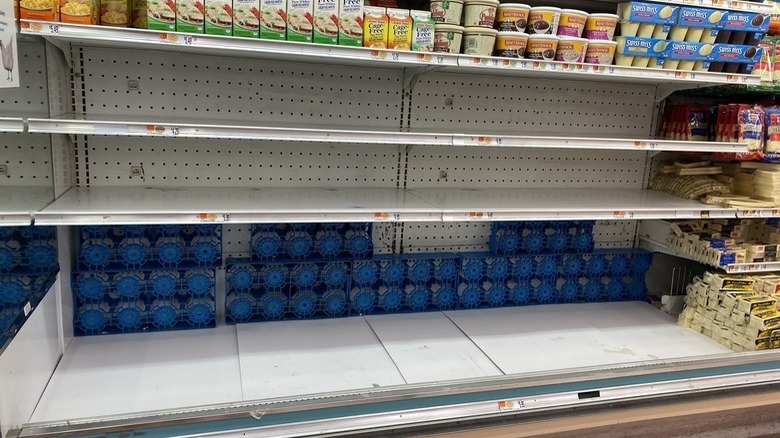Colorado Is Getting Slammed With A Massive Egg Shortage
The humble chicken egg has long been a staple in American pantries. Lovingly referred to as "nature's perfect food" (per Rolling Strong), it does have a lot going for it. Medical News Today shared that they're high in protein; are a source of vitamin A, B-12, and selenium; and benefit your eyes, skin, and brain health. They even come in a neat little shelled case.
Over recent years, the egg's popularity has dramatically increased. Why is everyone suddenly eager to embrace this breakfast food? The Washington Post purported that egg use went up a full 6% in 2016, a time that coincides with the government's backtracking on the cholesterol-related dangers of eating eggs. Yes, with many nutritionists switching to a positive view of the egg and calling it the "perfect protein," Americans upped their intake. In fact, back in 2019, the outlet proclaimed that the nation was gobbling up more eggs than it had for almost 50 years, approaching a yearly total of about 279 eggs eaten per American. Statista showed that by 2020, this figure had grown to a whopping 286.5 per capita. That's a lot of eggs to eat in one year.
Unfortunately, while Americans are busily adding more eggs to their diet, the nation is also grappling with a massive egg shortage. And one of the states that have been hit the hardest is Colorado.
A virus and a new law have impacted egg supply
While much of the nation is grappling with a very contagious avian influenza that has led to the death of a huge number of chickens, Colorado has been dealt a particularly devastating blow. Bill Scebbi, the Executive Director of Colorado Egg Producers shared with 9News that the state lost about 90% of its egg-producing chickens. He added that their flocks wouldn't likely be fully restored until about May. On top of that, KKTV explained that the state just introduced a new law that started this year requiring that egg producers provide their hens with a minimum living space of one square foot. The goal is to have all chickens completely out of cages by 2025. Scott Scarborough, Owner of City Farm in Montrose, Colorado explained to The Denver Post that with few farmers raising chickens in a cage-free environment, this has exacerbated the shortage. As a result, some grocery stores' egg coolers are completely empty or very low on stock.
Stacy Poore, a co-owner of Bread and Butter Neighborhood Market in Colorado Springs, told KKTV that even when eggs do return to normal supplies, this law will lead to an increased cost to farmers. This, in turn, will be passed on to the consumer, pushing egg prices through the roof. In other words, don't look for a return to the good old days of "eggs-a-plenty" at affordable prices any time soon.

